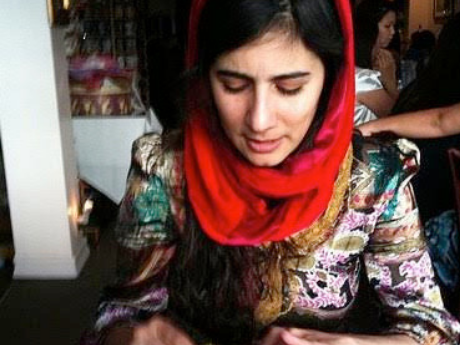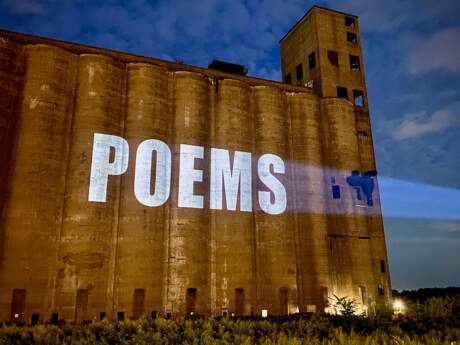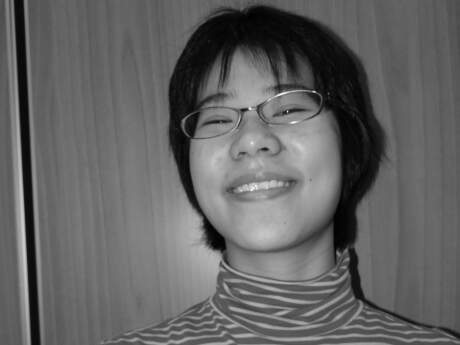Interviews
An Interview with Farnoosh Fathi of YALDA

YALDA is a new kind of literary intensive and publishing platform for young women authors ages 12-19. Farnoosh Fathi works with students to develop their manuscripts throughout the academic year and is now starting an NYC-based summer program to bring the students together. Next week, YALDA's first four authors will come to NYC to take a letterpress intensive at Ugly Duckling Presse, where they learn to design, print and bind their own chapbooks; they also participate in workshops and community-building events, culminating in a chapbook launch reading, all hosted by Poets House. Joshua Edwards recently interviewed Farnoosh about YALDA. If you'd like to support this tuition-free vision and labor of love visit here.
* * *
Joshua Edwards: Tell us about the name YALDA.
Farnoosh Fathi: The word "Yalda" is Persian, it means "birth." It refers to a Zoroastrian holiday called Shabeh Yalda, which means "Yalda Night," which takes place on the winter solstice. On Shabeh Yalda, everyone gathers around the fire and stays up on the longest, darkest night of the year—making a fire, reading poetry, telling jokes, eating pomegranates around it. There's this sense that by staying up all night together, by this fire, a purifying force, a light, is born of darkness. At sunrise, this birth of light, a new day begins, and on this day, historically, traditional hierarchies are inverted: the citizen becomes the ruler, the teacher becomes the student, and so on, in a ritual acknowledgement of equality and interdependence. YALDA's pedagogy is also based on this ritual: the teacher becomes the student, the student becomes the teacher; the idea that even though we have these distinct roles, they are shared and exchanged continually. The name Yalda also comes from the importance of poetry in Iranian culture—they are inseparable. Iranians believe poetry has deep humanity and a force of friendship, bringing people together. I remember Shabeh Yalda being this night where you read your Fal'e Hafez, where you receive a divination by turning to a random page of Hafez's poetry. You have a question in mind, and the Hafez's poem is a field in which you and your question meet. That kind of ancient faith in poetry is also why I chose the name YALDA. It's also, I just learned, the Hebrew word for "girl."
Joshua Edwards: Is it also an acronym?
Farnoosh Fathi: Yes, YALDA stands for the Young Artists Language and Devotion Alliance. It's an alliance of language and devotion, going hand in hand. In teaching I find a spirit of dedication and friendship toward a student profoundly supports learning, attention, and freedom in her art, so the acronym speaks to this spirit. It also points to questions that interest me as a poet as well as teacher. Where does "inside language" begin? Where does inside language begin and poetry end? "Inside" language, the mysterious language of friendships, has always meant a lot to me. In my closest friendship with a writer, Kristen Gleason, whom I have known since high school, I have cherished and explored the magical language of our friendship—of inside jokes, how friends memorialize their experiences that way, and how we have learned together that such inside language is an embodiment of friendship, how it can be an inspiration and a starting place for our art. Whether working independently or collaboratively, that friendship, that loving force of language is with us. It's a treasure.
So I want the YALDA young writers to have that experience of friendship in bringing them together, too. the name YALDA—it's very packed! "Everything is in everything," Joseph Jacotot said, and YALDA's meaning exists in Jacotot's langue maternelle; in Sugita Mitra's Granny Cloud; in the open-air debates of young nuns in Tibet; in a rural Thai orphanage of meditating child equestrians and Muay Thai boxers; and in Reggio Emilia, Italy where everyone knows that a child is "endowed with one hundred languages," and parents, teachers, friends endeavor to learn them.
Joshua Edwards: Can you tell me about Yalda's mission?
Farnoosh Fathi: It's a belief in the creative, visionary nature of youth, the sense that these young people are making some of the most exciting work in the country, but there's not necessarily the support or the platform in place to realize this work more fully. I remember reading the Prelude to MiddleMarch, the opening of George Eliot's novel, and she talks about the young Teresa of Avila making this child pilgrimage and that there are many Teresas who have been born "who find for themselves no epic life in which there is a constant unfolding of far-resonant action." She's saying there's no order or platform in society that recognizes that at a young age, someone is in touch with something and seeking something, with an ardently willing soul, like an epos. A kind of life beyond the self, an ecstasy. So she says something like, What were the many volumes of romances and tales of chivalry to a brilliant girl like her, the young Teresa? It's the question of what happens to this kind of epic soul that a young woman has? And working with younger students, it's been my experience, that I see the desire for an epos express itself in their writing and in their friendships. I see their visionary powers in their poems, and think, "Oh, these are the teenage girl-Rimbauds!" We know of the major influences of Rimbaud or Lautréamont, but what about those of the young women visionaries—the Joan Murrays, the Fatemeh Baraghanis, the Isabelle Eberharts whose works were lost in floods, figuratively and literally?
I have the sense that there is an abundance of visionary teenage writers—and a dearth of recognition and place for them. A safe place, especially for the young women, outside of school, that grows with them, proportionate to their gifts. My students tell me that it's hard to be taken seriously as young woman writer, to feel and express their confidence. It's been my experience that if they're given a sort of mentor, who truly believes and wants to have a relationship with them and their writing, that they can do and are doing incredible things. And so, the mission of YALDA grew out of recognizing these young Teresas or Charulatas, these young women writers who have begun to find their epos in writing. And my desire to be part of their learning how to grow and protect it. That's YALDA's mission. Understanding that, through friendship and dedication a new kind of language is always possible, and that these young writers are the ones who will create it.
Joshua Edwards: Can you tell me a little about the nature of the program itself?
Farnoosh Fathi: The program itself is year-round mentorship and working one-on-one, primarily online, face to face, throughout the academic year with students who I have taught before with or otherwise come to know. Some of these students were interested in how to publish their work, they wanted to be published as artists, without the ageist filter, and beyond submitting to contests say for the Scholastic awards. The problem at large is that, for one, they're taken less seriously because of their age, and furthermore, that if a student's writing about dark or complex themes; or if wants to explore a true freedom of expression, to write, for example, the "kingdom of my anus" in a poem, there's not enough of a place in the culture that gives them the same respect and freedom as one does to adult artists—to say one can do or say this because it is art. As a result teenagers often conform to a limited language for describing their emotional experiences, and it is an obstruction of their truth and it quickly becomes a tired and diminished experience of poetry.
So the idea was, "Well, why not bring these students together to New York City so they can share, collaborate and create the space they need for their work to grow?" I wanted them to be able to publish their own work and decide what kind of life they want for their work, and with support, to see they can create it for themselves. Being involved in the whole process of publication from start to finish, including their letterpress workshops in typesetting, printing and binding their chapbooks; in thinking about "How do I want to perform this, how do I extend the life of my work through performance in a way that feels true to me?"; and in learning from other young writers like Yasmin Belkhyr or Tavi Gevinson who have started their own magazines to great success. These young women are doing a lot of the braver and much needed work for change that other established magazines won't do. Belkhyr, for example, speaks brilliantly about how she has co-evolved with her magazine Winter Tangerine. That's something that YALDA will do too. The authors and I will have a chance to learn from Yasmin, who will be the guest speaker in our Poets House seminar on publishing as a young woman author. At Poets House, we will also be doing workshops on poetics and performance, in addition to writing new things. So there's the one-on-one component during the academic year, and there's also this summer program of coming together and sharing work, developing YALDA. My hope is that as the program grows, we'll build a space for YALDA online that can reach many young people. For example, next year, we want to make digital archives of the first four chapbooks, so even though there's only 100 chapbooks printed, they will be online and free to access to many other young readers at any time. UDP is our example and inspiration in this commitment to creating online archives for their chapbooks. And there will be our blog, an online space for the Yalda authors to continue to share new work—their writing and vision—and invite readers into their conversation.
Joshua Edwards: How does working with younger writers impact your own work as a poet?
Farnoosh Fathi: There's the joy of being inspired by their openness and freedom and for me it's an opportunity to see how each person expresses that uniquely. There are opportunities to work with younger writers through programs like writers in the schools or outreach programs through MFA's, but what I think is special about something that YALDA does is that you get to work with them one-on-one over a long period of time and as a result you get to watch their growth in a way that feels like it grows more out of your friendship together, like a mutual faith and interest. I think that's an incredible thing to be able to experience as a poet.
Skype and Google Docs are actually a incredible technology pedagogically speaking, in that they collapse the hierarchy of teacher and student. It's perfect for teenagers in that they're so used to just getting behind the computer and on a screen. On Googledocs, I think because of the trust that's there between you, you get to watch someone come up with alternative lines and to see the way they might approach something and be inspired about it and learn from it. For example, with Caroline Sasso, she understands that possibility is always with us and at hand, and so when I get to see her mind in motion as she's working on a revision, it's the biggest thrill. It feels like that's all that I want in life to be that reader in that moment to witness that, and it's incredibly encouraging to watch her access that kind of abundance of imagination and wildness. And then Lulu Priddy, she has this kind of humility and kind of ability to bring such care and tenderness into space. She can really bring pauses and deepen rests in the process of writing; you can see the blush of her sensibilities as they arise and the sort of trust she has in them. It's very inspiring. And Yovana Milosevic, you can see for her how honesty and beauty are these inseparable things and so you get that regard to be able to see that regard that comes from deep within that person. It's amazing. And Malia Maxwell has this ancient perspective, lightness and curiosity. All these qualities that you also see in children and in babies, and sometimes you think in teens it's hard to access, or that's sort of a notion people have about teens, and I find that untrue if you're able to connect with someone through their writing, as an equal in the mystery of that process, and it's an incredible gift to me, and it makes me much freer, and it strengthens my own dedication because I see theirs, intimately. They teach me by virtue of who they are, and I endeavor to do the same. In most workshops, the approach is so different, it's very prescriptive, but to just actually be with someone in their work, you get beyond "Is this poem good or bad?"; you get more into this a special thing that you are creating with your attention together. It feels like the best writing in the world as a result.
Joshua Edwards: Can you tell me a bit about how the program developed?
Farnoosh Fathi: The way that it developed, I had been working with the pre-collegiate group, and it's this group of kids that are coming in the summer to Stanford to take summer classes, and so I've met all these really dedicated young writers and worked with them in an intensive way over the course of three to six weeks. And then, at the end of each course I would say if anyone wants to continue working together I would love the opportunity to continue to support your work independently. And so over the years, each year maybe one or two students would take me up on this and I was so excited by the possibilities of teaching and also writing with these students. Once that started happening I saw their work was so exciting, to our collective surprise students would say, "I've written so many poems in this past year" and excited to share they wondered, "Where can I publish these?" and I may have mentioned this earlier or before, but I wanted to find a solution for something that was missing for them, and I just wanted to share their work with everyone. Even though on some deeper level, I've always felt like I've been moving towards this style of teaching and this program, the idea of doing four chapbooks and bringing these students together happened organically, it came into being and exists for them, because of who they are and what they have already done in their work. I was working with several students individually who were all doing incredible work, and I just wanted to make that possible for them to share their work.
So this work already exists, but through YALDA we're opening to possibilities for growth and impact. And still, in terms of what can it be, its growth, I like the idea of YALDA being "headed for small things." That's kind of my approach, working one-on-one, maintaining the quality of the relationships, because I've found that's the way we can create really strong foundations and effect change, change that is even immeasurable and invisible in its impact. My interest isn't really in having a big program, it's more, how can I continue to build this alliance and serve these young writers, but reach more people? Which means I'm not the only person doing it, and applying for grants, and getting support from the outside in order to be able to digitize the chapbooks and bring in more students and visiting guests this next summer, in order to keep it tuition-free. The goal is to find out what's possible when we bring these young writers together and we give them this sort of platform—and ask them to lead inquiry—how do you think it needs to develop, how do you think the teaching needs to be changed, what do you think the problems are with the way writing and reading is taught? Bring them together in the spirit of friendship and see what we can do together to bring the change need and deserve.
Joshua Edwards: We talked about the impact of these young authors on your own work as a poet; can you say something about the impact their work can have on the larger reading population?
Farnoosh Fathi: When these chapbooks come out I think poets will be inspired by reading them, as I have, and connect meaningfully to some part of themselves. Hearing these young women read their poems, which they will next week at Poets House—people, including their teachers, friends and families can better know the brilliant visionary individual among them; and they can further support this space for them to pioneer a freedom of expression outside the pressure-cooker of academic setting. There's this additional element in YALDA where the Zoroastrian inversion of hierarchy extends to voices within one's self—for example, a dualistic sense of "I know how to write a poem vs. I don't know how to write a poem." Sometimes those voices need to switch places, in order to move beyond them, and into your own freedom. When you read a magical poem by a young writer, their poems give you that gift.
(Interview conducted by phone, June 10, 2016)


